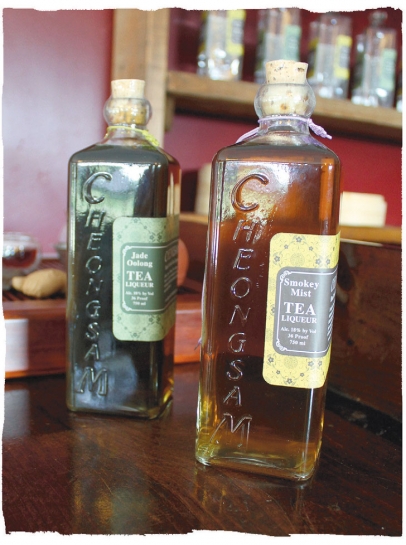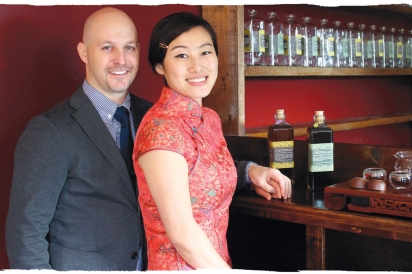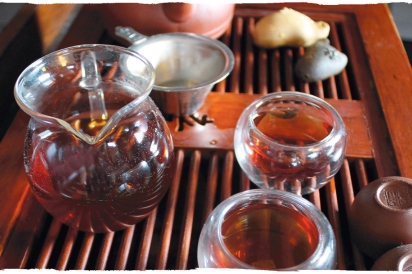Cheongsam Tea-Infused Liqueurs
East Meets West to Craft a New Flavor for Rhode Island and Beyond
“It’s about East meets West,” says Tyler Davenport, describing the roots of Cheongsam, the line of tea-infused liqueurs that he and his wife, Manda Shen, crafted in Shanghai and are importing to Rhode Island. Last winter the couple released their first two varieties: Jade Oolong is made with Ti-Kuan Yin oolong tea and has a delicate honeyed sweetness; Smokey Mist is reminiscent of whiskey, with osmanthus flowers lightening the earthiness of lapsang souchong and other black teas.
After four years in the making, the first 10,000 bottles of Cheongsam arrived in the Port of Providence last February, and Rhode Island bartenders were quick to experiment. The Eddy, in Providence, pairs Smokey Mist with gin, lemon, yuzu honey and smoked salt in a cocktail they call Bees on Bees on Knees. In Narragansett, the Coast Guard House perked up its brunch menu with lemonade spiked with Jade Oolong and vodka.
To peddle Cheongsam farther west, this summer the couple spent 11 out of 12 weeks on the road. This fall, Davenport made more U.S. sales calls, while Shen was in Shanghai.
“This is how we live our life,” Davenport says: “East meets West.”
A self-described free spirit with a quick wit and grin, Shen is originally from Hebei Province in northern China but she was working in a Shanghai hotel when she and Davenport first crossed paths. Although he grew up in Missouri, he’d studied culinary arts at Johnson & Wales and was working in the international food world, traveling frequently to China. This trip he was in Shanghai inspecting factories for a seafood exporter.
“On my last day in the hotel,” he says, “I was meeting with a guy and I could hear this woman talking—bantering—behind me. I turned to see who she was—you don’t often hear Chinese women cracking jokes in English—and I was smitten. I had to leave China that day, but when I got home I couldn’t stop talking about her. After six months of this my boss said, ‘Just get on a plane!’”
Davenport flew back to Shanghai and checked into the same hotel. Amazingly, Shen was still there. He asked her to show him around the city. “It was a ploy,” he admits.
The two kept in touch by email while the peripatetic Shen traveled to Laos and Malaysia. Then one day she wrote that she was back in Shanghai, and Davenport joined her. As they walked arm-in-arm through the city, “It felt like family,” she says.
Davenport returned to the United States, and they started Skyping—“Two hours in the morning and two at night,” he says. In 2010 they were married in Hebei, but they spent their first year apart waiting for Shen’s exit interview and U.S. paperwork to be completed. “Finally someone suggested contacting [U.S. Senator] Jack Reed’s office, and a week later we had permission for Manda to come,” Davenport recalls.
When they settled in Rhode Island the two were nursing a dream, and their first step was to open Cha-Bei, a cozy teahouse like the shops that are ubiquitous throughout China. Located on Broad Street, in Cranston, Cha-Bei felt like another world—warm, intimate, magical. Davenport built rustic wooden tables, stools and a roughhewn bar on which Shen brewed tea. The shop’s walls were lined with shelves full of glass jars of whole-leaf teas the two bought at the markets in Shanghai—oolongs from Anhui province and black teas from Fujian, as well as many varieties of white and green teas and their own blends, including a delicate mix with goji berries that bloomed scarlet when brewed.
In 2012 the couple added a few noodle dishes to the menu, and customers happily waited and chatted with Shen as she mixed noodles and broth on a hot plate, layering in pickled green beans, Chinese broccoli, a few slivers of Spam. Who knew Spam could be transcendent? Against the soundtrack of noodles being slurped, the place felt like a mash-up of the neighborhood bar on Cheers and a noodle joint in China.
As charming as it was, Cha-Bei was just a starting point for Shen and Davenport; behind the scenes he was tinkering with recipes for liqueurs based on tea. “We wanted to get the nuances of the tea right,” he says. But Shen was getting impatient. “He has the skills but I have the spirit,” she jokes.
“Manda took this to the next level,” Davenport says. “I was testing batches and batches, and she said, ‘When are you gonna stop jacking around?’” So they tried their liqueurs on friends, who offered to invest in the project.
As Shen and Davenport tell this story, they are standing in the nowclosed space that housed Cha-Bei. Once they’d committed to their new venture and were traveling regularly to China, they decided to shutter the restaurant. (Davenport says a Department of Health mandate that they update the restaurant’s sink was the final straw.) “We absolutely love this place,” he says. “But we never envisioned running a fulltime restaurant.” Shen nods as she pours hot water over tea leaves in a clay pot—pu’erh with toasted rice, she explains. It’s raining out, and “pu’erh will warm you up,” she says.
Shen and Davenport named Cheongsam after the figure-hugging satin dresses popularized in Shanghai in the 1920s, and they modeled their bottle after a Chinese cola bottle from the 1890s. A designer friend created their labels. And the couple found a Chinese alcohol-bottling factory that would let them use the plant.
Making ordinary cordials is a fairly simple affair: You infuse a neutral spirit (grain alcohol or vodka) with citrus zest, berries, rhubarb—whatever strikes your fancy. You let it sit awhile to extract the essential oils, discard the solids, and add sugar and water, usually in the form of simple syrup. Easy.
But extracting essential oils from fragile tea leaves requires finesse. “We barely touch them,” Davenport says. “When you make 1,000 liters of liqueur, you have to do it in small amounts so the leaves aren’t crushing each other. It’s so small-batch.”
For Smokey Mist, he and Shen extract the flavor from osmanthus flowers and lapsang souchong, and then add a mix of black tea extracts. They have a brief window to sweeten and dilute the mixture before bottling it. Shen describes a disastrous day last year when a delayed sugar shipment forced them to throw out entire batches of tea extract.
Purified water provided another challenge. The factory’s reverse-osmosis filter was too slow for their needs, so checking out a new factory was the goal of Shen’s fall Shanghai trip. Undaunted, she says, “I always like to try things in my life. I never think about failing.”
In 2017 Shen and Davenport plan to introduce two new liqueurs: Citron, made with lemongrass and green tea; and Wild Goji, a dark oolong with goji berries. In the beginning, Davenport jokes, “I was the cocktail person and Manda was the tea person. Now…,” he pauses. “Well, she makes a mean mojito…” Truth be told, he makes a mean pot of tea, too.
For more information visit Liqueur-de-Shanghai.com







